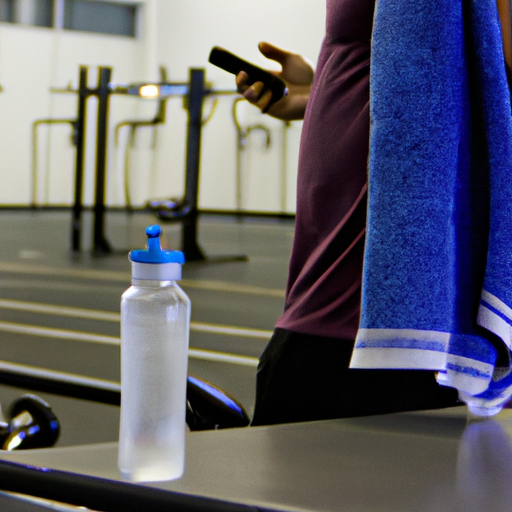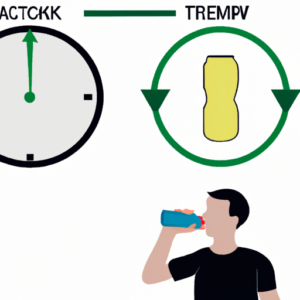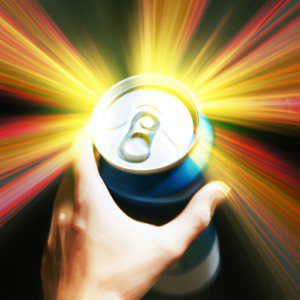Energy drinks are a popular choice among athletes and fitness enthusiasts due to the high levels of caffeine they contain. Caffeine can provide an energy boost before intense physical activity, but there is still debate as to whether or not energy drinks are safe to consume prior to exercise.
This article will explore the safety considerations related to drinking energy drinks before working out, with advice from registered dietitians and nutritionists. The effects of different types of energy drinks on performance and health will also be discussed in detail so that readers can make informed decisions about their pre-workout beverage choices.
Understanding Caffeine
Satire has been used for centuries to help audiences enjoy what is written. In this case, we will use it to discuss a topic that remains highly controversial: the consumption of energy drinks before a workout. After all, who doesn’t love a good debate?
Caffeine is a stimulant found in many food and beverage sources, including coffee, tea, soft drinks, and chocolate. Caffeine can also be found in some energy drinks and supplements marketed as performance enhancers or pre-workout aids.
While caffeine may provide an extra boost of energy during exercise, its effects on metabolism remain unclear. Studies suggest that moderate amounts of caffeine can improve physical endurance and alertness while excessive amounts can lead to anxiety and insomnia. Therefore it is important to understand your own tolerance levels when consuming caffeinated beverages prior to exercising.
Many experts recommend limiting intake of caffeinated products to no more than 200 milligrams (mg) per day (about two 8 ounce cups of brewed coffee). Additionally, it is best to avoid drinking any type of caffeinated beverage within four hours of bedtime so as not to interfere with sleep patterns.
Assessing Energy Drinks
When considering energy drink consumption before a workout, it is important to assess the benefits vs. risks, and moderation vs. excess of such beverages.
Energy drinks have been found to increase focus and alertness prior to exercise due to their caffeine content [1]. In addition, some ingredients like taurine can help with muscle contractions and endurance performance during exercise [2].
However, overconsumption of these drinks may lead to an increased risk for heart palpitations or arrhythmias due to high levels of caffeine and sugar [3]. Excess amounts of sugar in particular can have negative impacts on blood glucose regulation that could be detrimental if consumed prior to exercising [4].
Thus, when consuming energy drinks:
It should also be noted that individuals who are sensitive to stimulants or those taking medications might need even lower doses. Consulting with a physician should be considered in order to determine whether any additional precautions are necessary.
Potential Side Effects
Energy drinks are a popular choice for those looking to supplement their workouts, as they can often provide an extra boost of energy and mental alertness. However, it is important to consider the potential side effects that may arise from consuming these beverages prior to exercise.
Before taking such risks, individuals should assess their hydration levels and pre existing conditions in order to avoid any adverse reactions or health complications.
The primary concern with regard to energy drink consumption before physical activity is dehydration. If not enough water has been consumed prior to exercising, drinking large amounts of caffeinated beverages can increase the risk of becoming dehydrated during a workout session.
In addition, certain medical conditions could be exacerbated by the ingestion of excessive caffeine or sugar found in many energy drinks. People who have diabetes, high blood pressure or heart related issues should speak with a healthcare professional before incorporating these products into their diet routine.
It is essential for people engaging in physical activities to ensure adequate hydration and make sure there are no contraindications due to pre existing medical conditions before consuming commercially available energy drinks. For optimal results, individuals should carefully evaluate all potential risks associated with this type of beverage intake before using them as part of a regular exercise regimen.
Pre-Workout Alternatives
Staying hydrated before a workout is essential for proper performance. Many opt for energy drinks as a pre-workout beverage, but it can be detrimental to health due to the high sugar and caffeine content in these beverages.
Natural sources of energy are preferable over sugary options when hydrating prior to exercise. Below are some tips for keeping up with hydration levels while still having an adequate supply of energy:
It’s important to understand what types of food and drink best suit one’s needs before engaging in physical activity so that their body is properly fueled and energized for optimal performance. With careful planning and attention to nutrition, individuals can maintain healthy hydration levels and have sufficient amounts of energy both during and after their workout routine.
Making An Informed Decision
When it comes to making the decision on whether or not to consume energy drinks before a workout, there are many factors that need to be taken into consideration.
From comparing different types of energy drinks and their ingredients, to seeking advice from knowledgeable sources such as registered dietitians or nutritionists, it is important to make an informed choice.
In order to properly weigh out the pros and cons of consuming energy drinks prior to engaging in physical activities, examining labels is key. It is essential for individuals to take note of how much caffeine, sugar and other additives are present per serving; understanding nutritional facts can greatly assist with this process. Furthermore, if someone has any kind of medical condition or takes medication that could potentially interact negatively with certain energy drink components such as caffeine, then further research should be conducted in order to avoid any potential risks.
Having access to reliable information when making decisions regarding dietary choices is paramount. Those who may benefit from additional guidance should consider reaching out to certified professionals like registered dietitians or nutritionists who possess expertise and experience in providing sound advice relevant to individual needs and goals.
Additionally, they can provide insight on food-related topics such as safe ways of integrating pre-workout snacks or beverages into meal plans without compromising overall health objectives. Taking these steps will help ensure that people have the knowledge necessary for making responsible decisions about energy drink consumption before workouts.
Frequently Asked Questions
How Much Caffeine Is Considered Safe To Consume Before A Workout?
The allegory of a tightrope walker serves as an apt reminder for the importance of energy balance prior to exercise.
Caffeine is one source of energy that can help boost performance, although it must be consumed in moderation.
The American College of Sports Medicine recommends stopping caffeine intake at least six hours before exercise and cautions against taking more than 400 milligrams per day.
Thus, registered dietitians or nutritionists advise exercising caution when considering consuming energy drinks before working out; they suggest limiting oneself to no more than 200 milligrams (approximately two 8-ounce cups) of coffee prior to physical activity.
What Is The Best Time To Drink An Energy Drink Before A Workout?
Consuming an energy drink before a workout can provide beneficial energy sources and help maintain hydration levels.
The best time to drink an energy drink is approximately 30 minutes prior to the start of exercise, when consumed in moderation.
This gives enough time for absorption of the nutrients while not interfering with exercise performance due to too high of sugar or caffeine levels.
Additionally, it is important to stay properly hydrated during and after physical activity by drinking water throughout your workout routine.
Are There Any Benefits To Consuming Energy Drinks Before A Workout?
A case study of a long-distance runner who consumed an energy drink before their workout revealed that their hydration levels were better maintained and they experienced increased energy during the exercise.
While excessive sugar content can be counterintuitive for those engaging in regular physical activity, if done correctly there are potential benefits to consuming energy drinks prior to a workout.
For example, improved hydration levels due to electrolytes found in some energy drinks can help athletes maintain endurance and reduce fatigue while exercising.
Additionally, the caffeine found in many varieties may improve alertness and focus while providing an extra boost of energy which could lead to greater performance output.
Are There Any Natural Alternatives To Energy Drinks That Can Provide Energy Before A Workout?
Herbal supplements and energy bars are natural alternatives to consuming energy drinks before a workout.
Herbal supplements, such as ginseng or guarana, can provide an extra boost of energy for working out.
Energy bars also contain many essential nutrients that provide the body with an additional source of fuel that helps sustain performance during intense physical activity.
However, it is important to consult with a registered dietitian or nutritionist prior to taking herbal supplements or eating any type of food before exercising in order to ensure safe consumption.
Are There Any Long-Term Health Risks Associated With Consuming Energy Drinks Before A Workout?
According to the Centers for Disease Control and Prevention, consumption of energy drinks can pose a health risk when consumed before physical activity.
Energy drinks typically contain high amounts of sugar, caffeine, taurine, and other stimulants which can have an adverse effect on hydration levels.
In addition, blood sugar spikes caused by these ingredients may cause fatigue during exercise.
To ensure safety while consuming energy drinks before a workout, it is recommended that individuals consult with their healthcare providers or registered dietitians to learn more about how to safely consume them in order to prevent potential long-term health risks.
Conclusion
In conclusion, it is important to consider factors such as caffeine intake and timing when consuming energy drinks before a workout.
While these beverages can provide temporary boosts of energy for physical activity, there are potential long-term health risks associated with overconsumption and regular use.
To ensure optimal performance levels during workouts, one may want to opt for natural alternatives that offer the same benefits without compromising their health in the process.
With proper planning and consideration of all relevant information, individuals can make an informed decision on whether or not energy drinks should be part of their pre-workout routine.




